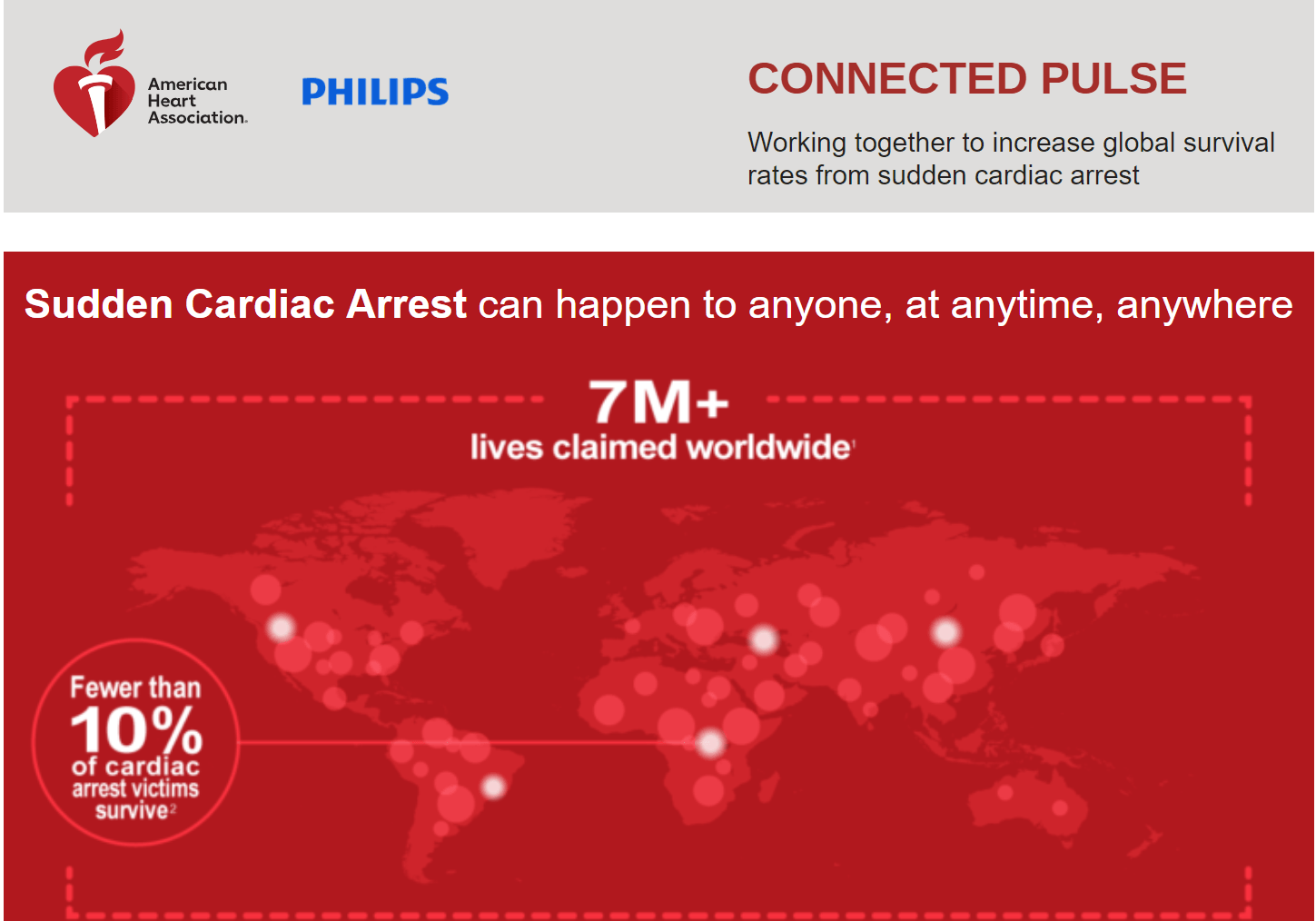
Today, Philips and the American Heart Association (AHA) announced a partnership to increase sudden cardiac arrest (SCA) survival rates outside the hospital around the world. This first-of-its-kind initiative, known as the Connected Pulse program, combines education and training to heighten awareness around CPR, the use of AEDs and other new technologies that can improve the chances for survival from the moment an incident occurs to the patient reaching the hospital.
Cardiovascular disease is a leading cause of global mortality, accounting for almost 17 million deaths annually – 31 percent of all deaths [1]. It is estimated that 70 to 80 percent of SCAs happen outside the hospital [2]. For every minute that passes without CPR and defibrillation, a SCA victim’s chance of survival decreases by seven to 10 percent [3].SCA can happen anywhere, at any time – accounting for millions of deaths worldwide. Every minute counts when it comes to SCA survival, and with bystander intervention and treatment with an AED, the survival triples. The Connected Pulse program helps optimize improved outcomes by providing training and education around the use of AEDs – empowering lay responders to intervene earlier and save a life.
Connected Pulse: Sudden Cardiac Arrest Initiative Overview
By leveraging technology to better connect victims and rescuers – both professional and lay responders – the Connected Pulse program helps optimize improved outcomes within the four critical steps of the chain of survival: 1) alerting emergency medical services; 2) giving CPR to the patient; 3) delivering treatment using an AED; and 4) advanced critical life support, provided by the emergency medical services. Training and awareness programs increase the likelihood of a lay responder being on-hand to provide CPR and treatment using an AED. In addition to the AEDs themselves, technology applications including mapping AEDs and automated alerting of nearby lay responders have the potential to significantly strengthen the chain of survival and increase survival rates.
Components of the customized end-to-end solution from Philips and the American Heart Association will include:
– GPS positioning – identifies the nearest available AED and a CPR certified person in close proximity to help assist.
– Command center application – software intelligently guides dispatch operators to coordinate care delivery to the patient during an SCA event.
– Integration and analytics engine – using industries standards, the solution will provide data-driven decision making to enable smooth data transfer across systems.
– Telephone CPR training – dispatch operators give hands-only CPR instructions over the phone until the emergency responders arrive. Out-of-hospital cardiac arrest (OHCA) patients who receive Telephone CPR are 64 percent more likely to survive to discharge than OHCA patients who do not receive CPR [5].
– Updated EMS Training – ensures first responders receive competency-based training on CPR and assess gaps to identify where better training is needed.
– Training Kiosks – interactive touch screens offer a 30-second CPR test, currently available in 32 high traffic areas in the U.S. including airports. More than 160,000 people have been trained on the kiosks.
– CPR in Schools Training kit – easy to use kit contains content to train 10 to 20 students at a time.
– AHA Training centers – currently available in 80 countries across the world, including China, Brazil, Japan, Mexico, United Arab Emirates, Italy and India.
– Public Education Training Campaign – drives awareness of symptoms of cardiac arrest and helps promote bystander education.
– In hospital CPR quality improvement through RQI (Resuscitation Quality Improvement) program – low-dose, high-frequency quarterly skills sessions improve CPR competency and are setting a new standard of resuscitation and patient care currently at more than 400 hospitals and for over 300,000 healthcare professionals in the U.S.
– Heartsaver Hero Award program – recognizing anyone who has been part of the chain of survival in any way with a Heartsaver Hero Award within the community.
– Consultancy, design and delivery – With its vast experience in health care transformation programs, the American Heart Association and Philips will consult, co-create, design and manage the implementation of the program as a turnkey solution to meet the needs of specific communities.
Philips and the AHA expect to announce the first pilot cities participating in the program in 2019.
[1] World Health Organization – https://www.who.int/news-room/
[2] Cardiac Arrest vs Heart Attack, American Heart Association, September 16, 2016
[3] AHA Releases 2015 Heart and Stroke Statistics, Sudden Cardiac Arrest Foundation, September 16, 2016
[4] Response to Cardiac Arrest and Selected Life-Threatening Medical Emergencies, Mary Fran Hazinski; et al, American Heart Association, September 16, 2016
[5] https://www.
